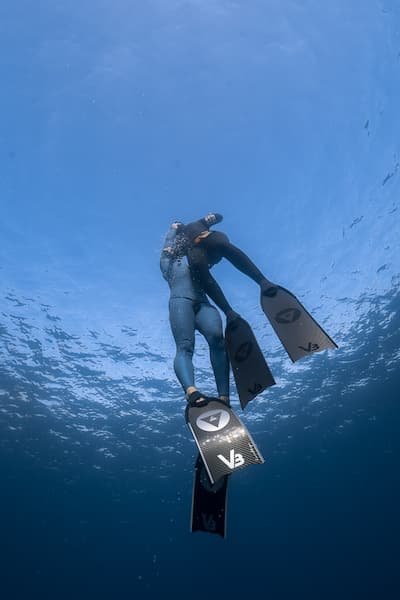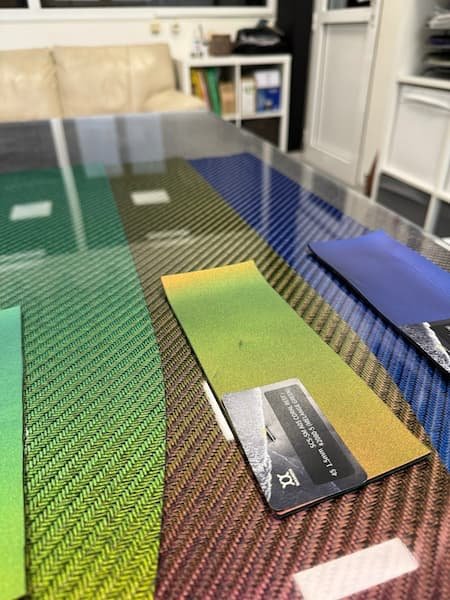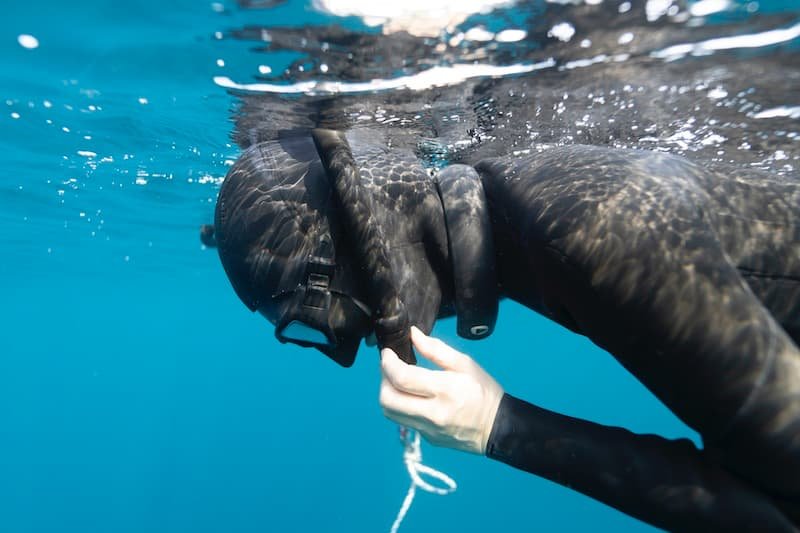
 Nick Pelios
Freediver, Creator
Nick Pelios
Freediver, Creator

 Nick Pelios
Freediver, Creator
Nick Pelios
Freediver, Creator
In the world of freediving and spearfishing, gear isn’t just equipment—it’s an extension of the diver’s body and their connection to the underwater world. At Alchemy, we believe that innovation and quality are non-negotiable, and we invest heavily in designing, testing, and refining every product before it reaches our customers. However, not every company in the industry shares the same ethos. In this article, we’ll explore the importance of rigorous gear testing, the high costs of true innovation, and the unsettling rise of companies that undermine the industry’s integrity by cutting corners.
Freediving and spearfishing are sports that push the limits of human ability, demanding not only exceptional physical and mental performance but also gear that can match those demands. Every dive, every kick, and every descent puts immense pressure on equipment, exposing even the smallest flaws. That’s why rigorous gear testing is so crucial. It’s not just a step in the production process; it’s a safeguard for safety, performance, and trust.
At Alchemy, rigorous testing begins long before a product hits the market. Our engineers and designers start by analyzing the product’s theoretical performance under a variety of conditions. Advanced simulations and lab testing help us understand how materials behave under stress, from the depths of the ocean to the surface where currents can exert chaotic forces. But lab tests can only go so far. To truly validate a product, it must be tested in the field, where real-world challenges push it to the extreme.
This is where our team of testers comes in—a dedicated group of freedivers, spearfishers, and underwater explorers who use Alchemy’s prototypes in their natural environment. These individuals aren’t just athletes; they are the heart of our innovation process. They take our gear to places where few dare to go: the crushing depths of open ocean descents, strong currents in unpredictable waters, and the silent voids of underwater caves. Their feedback is invaluable, offering insights that no machine or simulation could replicate.
The importance of these field testers cannot be overstated. They bring with them decades of experience, a deep understanding of the ocean, and a relentless drive to perfect their craft. These are people who know that the smallest detail—a slightly different blade angle, a more flexible material, or a change in buoyancy—can have a profound impact on performance. They not only test the gear but also help us refine it, pushing us to create equipment that meets the highest standards.
For example, when testing our carbon fins, athletes analyze how each variation affects propulsion, fatigue, and control. Do the fins provide enough thrust for efficient descents and ascents? Are they stiff enough to maintain power but flexible enough to reduce strain? They test every iteration of the product, often under grueling conditions, to ensure that what reaches our customers is nothing short of exceptional.
These testers also bring something intangible to the process: passion. They aren’t just using the gear; they are pushing it to the limits in their pursuit of excellence. Their dives often serve as real-world case studies, where every challenge faced becomes an opportunity for innovation. A dive that ends with a broken prototype isn’t a failure; it’s a lesson, an invaluable data point that helps us refine the product further.
Beyond the technical aspects, these athletes inspire us. They remind us why we’re committed to such a rigorous process in the first place. Watching them conquer new depths, achieve personal records, or explore uncharted underwater landscapes with gear we’ve created together is a constant source of motivation. Their passion for the ocean fuels our own dedication to building equipment that helps them reach new heights—or, in our case, new depths.
This synergy between Alchemy and our field testers ensures that every product we release is not only functional but exceptional. It’s their relentless pursuit of excellence that drives us to push boundaries, innovate beyond convention, and create gear that divers around the world can rely on. We owe much of our success to the extraordinary individuals who put our products to the ultimate test—ensuring that when our customers dive into the unknown, they do so with confidence.

Developing high-performance freediving gear isn’t a matter of placing an order from a factory catalog. It starts with a vision, often sparked by the needs of athletes or a desire to push the boundaries of what’s possible. Turning that vision into reality involves a team of designers, engineers, and craftspeople working tirelessly to create something new.
The process begins with research and development—testing materials, calculating, and engineering products that maximize efficiency while minimizing energy expenditure. Molds, which are required to produce various freediving equipment, are incredibly expensive and must be meticulously crafted to ensure precision. Every iteration of a product, every adjustment, adds time and cost to the development cycle.
At the end of this process, what emerges isn’t just a product; it’s a piece of equipment that reflects a commitment to the sport, to its athletes, and to the underwater world itself. The price tag on such gear reflects the immense effort that went into its creation. Quality and innovation simply do not come cheap.

In stark contrast to this commitment to craftsmanship, a troubling trend has emerged in the freediving and spearfishing industry. Some companies sidestep the demanding process of designing and developing gear by sourcing ready-made products from Chinese factories. These generic items are often low-cost, widely available, and lack the innovation required to meet the true demands of freediving.
What’s most disheartening—and frankly, unethical—is how these companies present these products to the public. By adding their logo and repackaging them with glossy marketing, they claim ownership of designs they had no part in creating. This practice not only misleads customers but also undermines the efforts of companies that dedicate years to creating genuinely innovative products.
Such shortcuts may allow these brands to sell gear at lower prices, but the hidden cost is borne by the industry itself. Divers who unknowingly purchase this gear often find it lacking in performance, durability, or safety, and their trust in the sport’s equipment suffers as a result. Worse, these practices devalue the hard work and creativity of true innovators, making it harder for them to compete in a marketplace flooded with cheap imitations.

At Alchemy, we believe that integrity is the foundation of innovation. When we develop a product, we don’t just aim to meet the standards of the industry—we aim to set new ones. This philosophy drives us to invest in materials, research, and testing, even when the costs are high. It’s why we collaborate with athletes who push our gear to the edge of possibility and why we constantly seek new ways to improve.
We take pride in knowing that every piece of Alchemy equipment represents not just a product, but a promise: a promise of quality, reliability, and performance. It’s a commitment we make not only to our customers but also to the sport of freediving itself.